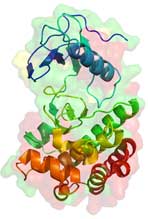
The Institute of Cancer Research (ICR) and The Royal Marsden NHS Foundation Trust are to progress into patient trials an experimental drug to combat the most deadly form of skin cancer.
The BRAF-inhibitor has the potential to treat more sub-types of malignant melanoma than any other targeted treatments for this cancer. Scientists also believe that it will not cause the serious side-effect of squamous cell carcinoma that has been linked to an existing treatment.
The project has attracted a £3million commitment from the Wellcome Trust, who will work with the ICR and The Royal Marsden through their Strategic Translation Award programme to further refine the candidate compounds and take the most promising into the clinic.
Principal Investigator Professor Caroline Springer from the ICR says: “Our compounds are showing a lot of promise in the laboratory and it’s very exciting that soon one will be available to patients through a clinical trial. It’s very rare for drug development to be advanced to the clinical trial stage without the involvement of a pharmaceutical company, so the Wellcome Trust’s commitment is a testament to the strength of our work so far.
“Compared to the existing drug, our compounds have the potential to treat more tumour types – potentially three-quarters of all malignant melanomas - and we also believe we have found a way to prevent a significant side-effect. This illustrates how basic scientific research into understanding the molecular and genetic causes of cancer is so important in making sure patients receive the best possible care.”
Both the first targeted treatment for malignant melanoma, Roche-produced vemurafenib (Zelboraf), and the new compounds are based on research at the ICR showing that the mutated BRAF gene is driving cancer development in around 50 per cent of malignant melanomas. In addition to inhibiting BRAF, the new compounds are also expected to block the action of another mutated gene, called RAS, which drives a further 25 per cent of malignant melanomas. Blocking these faulty genes should cause cancer cells to die and tumours to shrink.
One recognised side-effect of vemurafenib is that it can induce another type of skin cancer, called squamous cell carcinoma, in some patients who receive the drug. Earlier studies at the ICR showed that these carcinomas may be triggered when vemurafenib blocks the normal BRAF in cells in which RAS is faulty. This is thought to lead to a protein related to BRAF called CRAF becoming activated, which drives these carcinomas.
Scientists at the ICR have already developed a series of compounds that block both BRAF and CRAF and shortlisted the two most promising versions.
The new funding will enable the team in the ICR’s Cancer Research UK Cancer Therapeutics Unit to select the best drug candidate for initial safety testing and determine an appropriate dose to give to patients. Clinicians in The Royal Marsden Hospital’s Melanoma Unit will then lead early clinical trials. The team will also examine the different types of melanoma for which the drug is effective, including whether it can benefit patients who have relapsed after taking vemurafenib.
Dr James Larkin from The Royal Marsden said: “We are delighted by this partnership between The Royal Marsden, the ICR and the Wellcome Trust and are thrilled by the commitment from the Wellcome Trust to our research. We know that BRAF inhibitors such as vemurafenib benefit a large number of melanoma patients with BRAF mutations but most patients become resistant to treatment. Therefore there is a need to develop more effective drugs and also to target melanomas which do not have BRAF mutations.”
The incidence of malignant melanoma is increasing in the UK, with around 10,000 people diagnosed and 2,300 deaths a year. The disease is difficult to treat once it has spread to other organs.
BRAF-targeting drugs may also be important in other tumour types, as mutations in this gene are common in thyroid cancer (45 per cent of cases), ovarian cancer (10 per cent), and colorectal cancers (13 per cent).